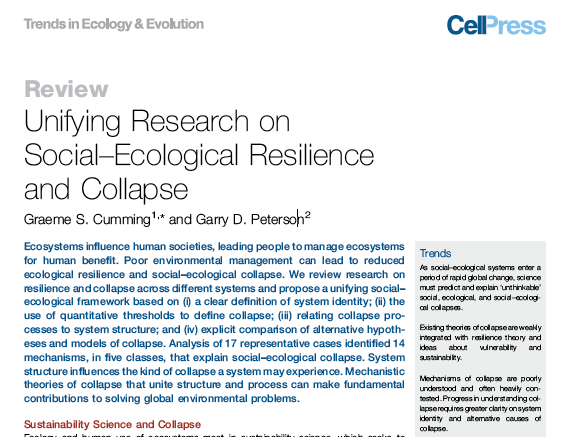File: Download
Year of Publication: 2017
Publisher: ElsevierLtd.
Author(s): Graeme S.Cumming , Garry D. Peterson
Journal: Trends in Ecology and Evolution
Volume: http://dx.doi.org/10.1016/j.tree.2017.06.014
Abstract: Ecosystems influence human societies, leading people to manage ecosystems for human benefit. Poor environmental management can lead to reduced ecological resilience and social–ecological collapse. We review research on resilience and collapse across different systems and propose a unifying social– ecological frame work based on(i)a clear definition of system identity; (ii)the use of quantitative thresholds to define collapse; (iii) relating collapse processes to system structure; and (iv) explicit comparison of alternative hypotheses and models of collapse. Analysis of 17 representative cases identified 14 mechanisms, in five classes, that explain social–ecological collapse. System structure influences the kind of collapse a system may experience. Mechanistic theories of collapse that unite structure and process can make fundamental contributions to solving global environmental problems.
Summary:
The corner stones of our proposed framework for a theory of collapse include(i) the use of clearly specified criteria for collapse, focusing on the four criteria presented in Box 1; (ii) the development and empirical testing of quantitative thresholds to define collapse;(iii)relating collapse processes explicitly to system structure ,as defined using the concept of the heterarchy [70]; and(iv) explicit comparison of alternative hypotheses and models of collapse. Our proposed framework promises to unite the different perspectives around collapse into a new and stronger body of theory, although considerable work remains(OutstandingQuestions). Explicitly comparing alternative mechanisms of collapse will allow research on thresholds, traps, and tipping points to be connected to the related areas of scenario planning, resilience assessment, and social–ecological transformation. This in turn will facilitate the design and implementation of portfolios of strategies to build resilience to collapse in ways that are robust across multiple possible, but uncertain mechanisms of collapse. A theory of collapse should thus contribute to both the development of new theory and to better, more sustainable management and policy choices.
The views and opinions expressed through the MAHB Website are those of the contributing authors and do not necessarily reflect an official position of the MAHB. The MAHB aims to share a range of perspectives and welcomes the discussions that they prompt.
